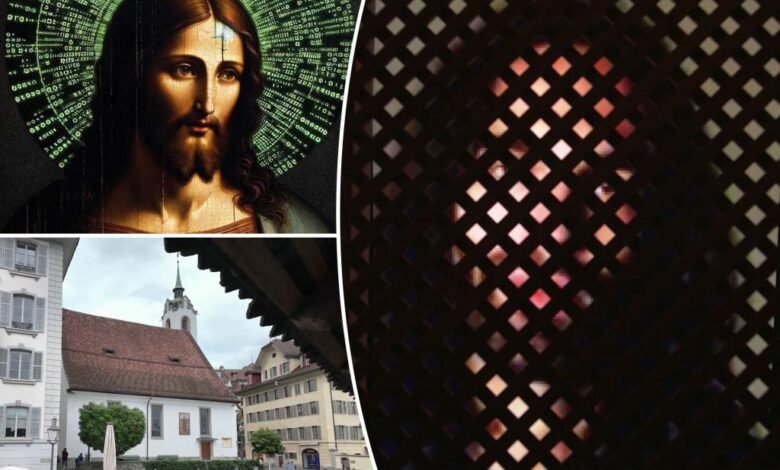‘It gave me so much advice’


Is this the mess-AI-iah?
Just in case artificial intelligence hasn’t been taking on enough jobs lately — and now it’s replacing the almighty. A church in Switzerland is now using an AI hologram of Jesus to take confessions from worshippers, as seen in a wild video blowing up online.
“I was surprised, it was so easy, and though it’s a machine, it gave me so much advice,” one awestruck worshipper told DW News while describing their experience with the Sermon-ator, located at St Peter’s Church in Lucerne.
Dubbed Deus in Machina, the futuristic shrine features a confessional booth with a screen displaying the face of Jesus through the grate.
Before entering, robo-Jesus cautions, “Do not disclose personal information under any circumstances, use this service at your own risk, press the button if you accept.”
If the worshipper opts to proceed, the digitally-rendered visage interprets their words and generates a response with the animated face moving in sync with the words.
When asked why women aren’t allowed in the church in the clip, the digital son of God responded, “The scriptures teach that certain roles are defined within the church, each role and task has its place in God’s plan.”
“How can you promote peace and harmony in your life,” the holy-graphic messiah added.
Jesus’ cybernetic second coming was made possible by computer scientists and theologians from the Lucerne University of Applied Sciences and Arts, who programmed the bot with New Testament and religious information found online, the Daily Mail reported.
The cybernetic savior is also fluent in 100 different languages, enabling it to converse with worshippers from all over the world.
Many believers were over the moon about JC’s robo-resurrection, which took confessions between August 23 and October 20 but will be involved in events until the end of November.
“I asked about the spiral of violence, how to break one,” recalled one satisfied visitor. “The answer: through prayer and not seeking retribution.”
Another recounted, “He was able to reaffirm me in my ways of going about things and he was able to help me with questions I had like how I can help other people to understand him better and come closer to him.”
AI Christ was even able to navigate some of the thorniest theological dilemmas. “How do I support, from a Christian perspective, an elderly, sick person who has decided on assisted suicide?” asked one penitent.
“Perhaps you could ask your loved one the following questions…What does your faith mean to you in this difficult time?” AI Jesus responded. “Is there anything else in life that could bring you peace or joy? How can I support you and give you comfort?”
It added, “Your task is not to judge, but to accompany with love.”
Of course, not everyone was thrilled with the idea of JC’s digital middleman with some labeling it a “gimmick” while others called the avatar’s advice “generic.”
The church even received an ominous warning that the project “will not be without consequences.”
Meanwhile, Professor Peter Kirchschläger, a theologian and ethicist from the University of Lucerne claimed that machines don’t have the moral compass required to practice religion.
“That’s an area where we humans are actually vastly superior to machines so we should do these things themselves,” he declared.
St Peter’s Chapel theologist Marco Schmid admitted in a statement (translated via Google) that while the project “has its limits” and raises some ethical questions, so far all his answers have “matched our theological understanding of St. Peter’s Chapel.”
He says the idea isn’t to have technology take Jesus’ job — the church reiterated that installation was only temporary — but rather to spur discussions on the role of AI in religion.
“What we’re doing here is an experiment, we wanted to launch the discussion by letting people have a very concrete experience with AI,” he explained. “That way we have a foundation for talking about it and discussing it with one another.”
Schmid envisioned the AI offering 24-hour on-call pastoral support as unlike their human equivalents, virtual priests don’t need to sleep.
Source link




